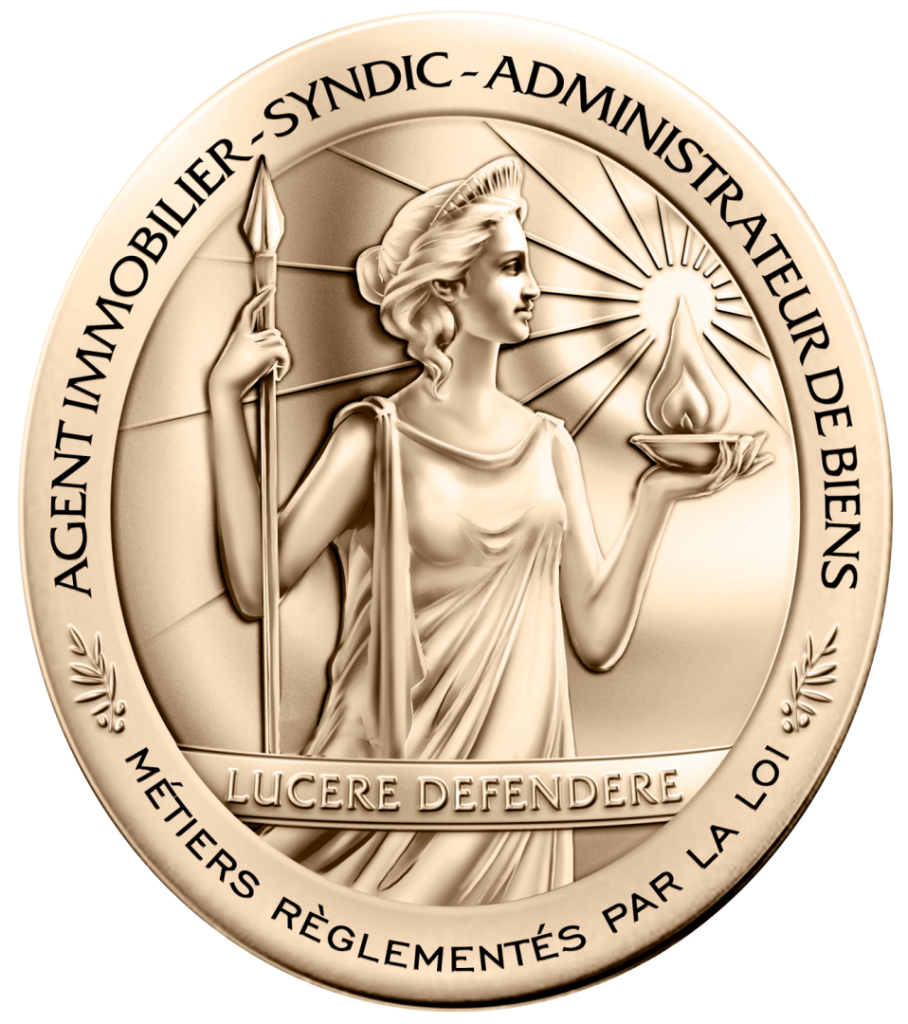
The Federation of Buyer Agents (FCI)
supervises, organizes and represents buyer agents
with buyers, real estate professionals and public authorities.
BUYER AGENT
A REGULATED AND SUPERVISED BUSINESS
The Hoguet law regulates our profession
The FCI brings together real estate hunters within the framework of the Hoguet Law n°70-9 of January 2, 1970 regulating the real estate profession, of which here are some extracts:

The members of the FCI undertake to respect the regulations of our Federation as well as the Code of Ethics.
It is a guarantee of seriousness for the real estate market and the beneficiaries.
Article 1
Amended by LAW n°2014-366 of March 24, 2014 – art 24 (V)
The provisions of this law apply to natural or legal persons who, in a usual manner, engage in or lend their assistance, even on an ancillary basis, to transactions relating to the property of others and relating to:
- The purchase, sale, search, exchange, rental or subletting, seasonal or not, bare or furnished, of built or unbuilt buildings;
- The purchase, sale or lease-management of businesses, (…)
Article 3
Modified by LAW n°2021-1104 of August 22, 2021 – art. 171 (V)
The activities referred to in Article 1 may only be exercised by natural or legal persons holding a professional card, issued, for a period and according to the procedures set by decree in the Conseil d’Etat, by the president of the chamber of commerce and territorial industry or, in the constituencies where there is no territorial chamber of commerce and industry, by the president of the regional chamber of commerce and industry, specifying which of the operations they can accomplish. (…)
Article 6
Amended by Ordinance No. 2016-131 of February 10, 2016 – art. 6
(…) No property, effect, value, sum of money representing fees, research costs, procedures, publicity or any mediation whatsoever is due to the persons indicated in Article 1 or may be required or accepted by them, before one of the transactions referred to in that article has actually been concluded and recorded in a single written document containing the commitment of the parties. (…)
The code of ethics governs our practices
The FCI property hunters act in such a way as to place their profession in a lasting way in the real estate landscape, by displaying a desire for transparency and partnership, both with consumers and with real estate professionals and public authorities.
They are signatories of the Charter of ethics for real estate buyer agents.

Code of Ethics
of the Fédération des Chasseurs Immobiliers
- The members of the federation are real estate professionals specialized primarily in the search for real estate for acquisition or rental. They represent the interests of their buyer or tenant client for the sake of transparency and neutrality.
- The members of the federation undertake to strictly respect French and European legislation, in particular the Hoguet law (law n° 70-9 of January 2, 1970, and its successive modifications) and its various implementing decrees regulating the conditions of exercise. activities relating to certain transactions relating to buildings and businesses, in particular:
- The members of the federation are obligatorily holders of the professional Transaction card issued by the Chamber of Commerce and Industry of their head office. They are covered by professional insurance and have a financial guarantee, except in the event of non-handling of funds as provided for in article 3.2 of the Hoguet law;
- The commitments of the members of the federation vis-à-vis their customers are contractual. All search missions are the subject of a written search mandate which stipulates, in particular: the description of the property sought, the means implemented, its duration and the conditions of remuneration. This mandate will follow the delivery of a Pre-contractual Information Document. In the case of door-to-door canvassing with an individual, the mandate must be accompanied by a withdrawal form, allowing the individual to exercise his right of withdrawal within 14 days, in accordance with Articles L. 222 -1 to L. 222-18 of the consumer code;
- They undertake to respect the following provision, when the principal is an individual: “No property, effect, value, sum of money, representative of fees, research costs, process, advertising or any intermediary , is due to the persons indicated in Article 1 or cannot be demanded or accepted by them, before one of the transactions referred to in the said article has been effectively concluded and recorded in a single written document containing the commitment of the parties. .
In summary, they undertake not to receive any remuneration before the completion of the mandate recorded on the date of the signing of the notarial deed in the context of an acquisition or the signing of the lease in the context of a rental.
When the principal is a professional or acts within the framework of his professional activities, the remuneration of the agent may be increased by the costs incurred and the agent may claim payment of the costs incurred and the fees even before the transaction has actually been concluded or observed; - The members of the federation undertake to respect their training obligations, both for the holder of the transaction card and for each authorized commercial agent, within the framework defined by the ALUR law, namely 42 hours every 3 years, including at least 2 hours devoted to ethics and the fight against money laundering (Tracfin) and 2 hours for the fight against discrimination in access to housing;
- The members of the federation who wish to offer services unrelated to intermediation in the transaction are authorized to use the service contract, as long as the activity concerned does not fall within the scope of the Hoguet law (for example : interior decoration, brokerage…).
- The members of the federation undertake to take the necessary steps with the Chamber of Commerce and Industry on which they depend, in order to authorize on their transaction card each independent commercial agent with whom they will contract. They ensure that each independent commercial agent is covered by professional insurance.
- The information provided by the customers of the members of the federation is strictly confidential. They may not be distributed in any way, to anyone, without prior agreement.
- The members of the federation undertake to provide their clients, in complete transparency, with all the information concerning the mission and to keep them regularly informed of the progress of their procedures. Any visit to a property by the principal must be done in the presence of the agent, except in exceptional cases. The members of the federation undertake to support their clients until the signing of the final act.
- The members of the federation undertake to respect total transparency, and to establish a climate of trust with all real estate professionals.
- The members of the federation are committed to upholding the ethics and image of real estate hunters, without denigration, in order to positively develop the profession in a sustainable way.
- The members of the federation undertake not to commit any of the discriminations mentioned in article 225-1 of the penal code, both with regard to natural persons and legal persons.
- The members of the federation undertake to ensure compliance with their obligations in terms of the fight against money laundering and the financing of terrorism pursuant to Article L. 561-2 of the Monetary and Financial Code.
Fédération des Chasseurs Immobiliers – 16 rue Saint-Marc – 75002 Paris – Association Loi 1901
The Hoguet Law
Law n° 70-9 – 2 January 1970 (see on Legifrance.gouv.fr)
Regulating the conditions of exercise of activities relating to certain transactions relating to buildings and goodwill.
Last update of the legal text: 25th August 2021
- Title I: Of the exercise of the activities of mediation and management of buildings and goodwill. (Articles 1 to 8-3)
- Title II: Incapacity to exercise activities of mediation and management of buildings and goodwill. (Articles 9 to 13)
- Title II bis: The National Council for Real Estate Transactions and Management (Articles 13-1 to 13-4)
- Title III: Penal and administrative sanctions. (Articles 14 to 18)
- Title IV: Miscellaneous provisions. (Articles 19 to 20)
Title I: The exercise of intermediary activities and the management of buildings and goodwill (articles 1 to 8-3).
Article 1
Updated by Law n°2014-366 on 24 March 2014 – art. 24 (V)
- The provisions of this law apply to natural or legal persons who, in a usual manner, engage in or lend their assistance, even on an ancillary basis, to transactions relating to the property of others and relating to:
The purchase, sale, search, exchange, rental or subletting, seasonal or not, bare or furnished, of built or unbuilt buildings; - The purchase, sale or lease-management of businesses;
- The transfer of dead or alive livestock;
- The subscription, purchase, sale of shares or shares in real estate companies or participatory housing companies giving rise to the allocation of premises for use or ownership;
- The purchase, sale of non-negotiable shares when the corporate assets include a building or a business;
- property management;
- With the exception of publications by way of the press, the sale of lists or files relating to the purchase, sale, rental or subletting bare or furnished of built or unbuilt buildings, or to the sale goodwill;
- The conclusion of any contract for the enjoyment of a timeshare building governed by Articles L. 121-60 et seq. of the Consumer Code;
- The exercise of the functions of syndic of co-ownership within the framework of the law n° 65-557 of July 10, 1965 fixing the statute of the co-ownership of the built buildings.
NOTE: In accordance with article 24-VI of law no. 2014-366 of March 24, 2014, these provisions only apply to contracts entered into after the entry into force of said law.
Article 1-1
Updated by Law n°2014-366 on 24 March 2014 – art. 24 (V)
For the purposes of this law:
- The rental or subletting, seasonal or not, bare or furnished, of built or unbuilt buildings is considered to fall within the real estate management activity when it is an accessory to a management mandate;
- Is considered as a seasonal rental for the application of this law the rental of a building concluded for a maximum and non-renewable duration of ninety consecutive days.
When these rentals involve an intermediary, their conditions of conclusion are specified by a Conseil d’Etat decree.
NOTE: In accordance with article 24-VI of law no. 2014-366 of March 24, 2014, these provisions only apply to contracts entered into after the entry into force of said law.
Article 2
Modified by LAW n°2018-1021 of November 23, 2018 – art. 117
The provisions of this law do not apply:
- To the members of the professions whose list will be fixed by decree, in consideration of the control to which their professional activity is subject as well as the financial guarantees that they offer for the exercise of this activity;
- To persons or their spouses who, on a non-professional basis, engage in or assist in transactions relating to property over which they have divided or undivided real rights;
- To persons acting on behalf of their spouse, relatives in succession, or on behalf of protected adults or minors under the conditions provided for in Titles X and XI of the Civil Code;
- To the legal or statutory representatives of construction companies governed by articles L. 212-1 and following of the construction and housing code for the realization of the first transfers of units or shares.
- To holders of a travel agent license, under Law No. 92-645 of July 13, 1992 setting the conditions for the exercise of activities relating to the organization and sale of trips or stays, for the conclusion of any contract for the enjoyment of a timeshare building governed by Articles L. 121-60 et seq. of the Consumer Code;
- Real estate collective investment undertakings, professional real estate collective investment undertakings, real estate investment companies and their management companies, except when they manage real estate assets subject to specific management mandates;
- To associations working to promote intergenerational cohabitation as defined in article L. 118-1 of the social action and family code and articles L. 631-17 to L. 631-19 of the construction code and housing.
Article 3
Modified by LAW n°2021-1104 of August 22, 2021 – art. 171 (V)
The activities referred to in Article 1 may only be exercised by natural or legal persons holding a professional card, issued, for a period and according to the procedures set by decree in the Conseil d’Etat, by the president of the chamber of commerce and territorial industry or, in the constituencies where there is no territorial chamber of commerce and industry, by the president of the regional chamber of commerce and industry, specifying which of the operations they can accomplish. When the president of the Chamber of Commerce and Industry concerned carries out an activity mentioned in article 1, the card is issued by the vice-president, under conditions fixed by decree in Council of State.
CCI France establishes and updates a file of persons holding the professional card, according to the procedures defined by decree.
This card can only be issued to individuals who meet the following conditions:
- Justify their professional aptitude;
- Proof of a financial guarantee allowing the reimbursement of funds, effects or securities deposited and specially allocated to the latter, including the sums paid to the works fund mentioned in article 14-2-1 of law n ° 65-557 of July 10, 1965 fixing the status of co-ownership of built buildings with the exception, however, of persons declaring their intention not to hold any funds, effects or values, for the activities mentioned in Article 1, with the exception of those mentioned in 6° and 9° of the same article under the conditions set by decree of the Conseil d’Etat. Only financial guarantors who have implemented internal control procedures, using a reference system and risk monitoring models, are authorized to issue the financial guarantee. A Conseil d’Etat decree defines the procedures and conditions under which the guarantors carry out their missions of control over the funds that they guarantee pursuant to this article;
- Take out insurance against the pecuniary consequences of their professional civil liability;
- Not be subject to one of the incapacities or prohibitions to exercise defined in Titles II and II bis below.
The guarantee mentioned in 2° above results from a written commitment provided by a specially approved insurance company, by a credit institution, a financing company or an institution mentioned in Article L. 518-1 of the Code monetary and financial.
The methods for determining the amount of the guarantee are fixed by decree in Conseil d’Etat.
The card is only issued to legal persons if said persons meet the conditions set out in 2° and 3° above and if their legal and statutory representatives meet the conditions set out in 1° and 4° above.
A prior declaration of activity must be made for each establishment, branch, agency or office by the person in charge of its management. This person must, in addition, satisfy the condition provided for in 1° and not be subject to one of the incapacities or prohibitions to practice defined in Title II of this law.
NOTE: Refer to the conditions of entry into force provided for in VI of Article 171 of Law No. 2021-1104 of August 22, 2021.
Article 3-1
Amended by LAW n°2015-990 of August 6, 2015 – art. 102
The persons mentioned in article 1 and, in the case of legal persons, their legal and statutory representatives, in the last paragraph of article 3 and in article 4 are, with the exception of those mentioned in article 8-1, subject to a continuous training obligation. Their professional card cannot be renewed if they do not justify having fulfilled this obligation.
A decree determines the nature and duration of the activities likely to be validated under the obligation of continuing education, the methods according to which it is accomplished, those of its control and those of its justification in the event of renewal of the card. professional.
Article 4
Modified by LAW n°2018-1021 of November 23, 2018 – art. 156
Any person authorized by a holder of the professional card to negotiate, mediate or commit on behalf of the latter demonstrates professional competence, quality and the extent of his powers under the conditions set by decree. in the Council of State. The provisions of Title II of this law are applicable to it.
The provisions of Chapter IV of Title III of Book I of the Commercial Code are applicable to the persons referred to in the first paragraph when they are not employees. These people must take out insurance against the pecuniary consequences of their professional civil liability, under conditions set by decree in the Conseil d’Etat.
These people cannot:
- Receive or hold, directly or indirectly, sums of money, goods, effects or securities or dispose of them during the activities mentioned in Article 1 of this law;
- Give legal advice or draft deeds under private signature, with the exception of mandates entered into for the benefit of the holder of the professional card mentioned in Article 3;
- Managing a facility, branch, agency or office.
Persons who, on the date of entry into force of the Conseil d’Etat decree mentioned in the first paragraph of this article, have the authorization mentioned in the first paragraph are deemed to demonstrate the professional competence mentioned in this article.
Article 4-1
Amended by LAW n°2015-990 of August 6, 2015 – art. 102
When the persons mentioned in Article 1 offer their clients the services of a company, they are required to inform them, under the conditions defined by decree in the Council of State and before the conclusion of any contract with the said company, of the any direct links of a capital nature or links of a legal nature that they or their legal and statutory representatives have or that the persons mentioned in the last paragraph of article 3 and in article 4, acting for these clients, have with this company.
This obligation also applies when the persons mentioned in the same article 1 offer their clients the services of a banking establishment or a financial company.
The persons mentioned in the last paragraph of the same article 3 and the persons authorized by a holder of the professional card in accordance with the same article 4 are required to inform him of the links mentioned in the first and second paragraphs of this article that they have with a company. , a banking establishment or a financial company whose professional card holder offers services to its customers.
Article 4-2
Creation LAW n°2016-1888 of December 28, 2016 – art. 48
With a view to housing seasonal workers and by way of derogation from the second paragraph of Article 4 and Article 6, the approved bodies, in accordance with Article L. 365-4 of the Construction and Housing Code, may authorize, for certain missions covered by this law, personnel of a local authority. A Conseil d’Etat decree specifies these missions.
Article 4-2
Creation LAW n°2017-86 of January 27, 2017 – art. 124
Subject to the provisions requiring them to disclose certain information, the persons mentioned in Article 1 of this law and, in the case of legal persons, their legal and statutory representatives respect the confidentiality of the data of which they are aware. in the exercise of their activities. This principle does not preclude the communication to the co-owners of any element necessary for the proper functioning of the syndicate. It also does not prevent the reporting of manifestly unworthy housing within the meaning of Article 1-1 of Law No. 90-449 of May 31, 1990 aimed at the implementation of the right to housing to the mayor of the municipality. concerned.
Article 5
Updated by Law n°2014-366 on 24 March 2014 – art. 24 (V)
The persons referred to in Article 1 who receive, hold sums of money that do not constitute remuneration or fees, property, effects or securities, or dispose of them, in any capacity and in any way whatsoever , on the occasion of the operations specified in said article, must comply with the conditions provided for by decree in Council of State, in particular the formalities for keeping registers and issuing receipts, as well as the other obligations arising from the mandate.
NOTE: Under the terms of Article 24 VIII of Law No. 2014-366 of March 24, 2014, the provisions introduced by 7° of I of the same Article 24 come into force on the first day of the fourth month following that of promulgation. of the said law, i.e. July 1, 2014.
Article 6
Amended by Ordinance No. 2016-131 of February 10, 2016 – art. 6
I-The agreements entered into with the persons referred to in Article 1 above and relating to the operations mentioned in its 1° to 6°, must be drawn up in writing and specified in accordance with the provisions of a decree in Council d ‘State :
The conditions under which these persons are authorized to receive, pay or remit sums of money, goods, effects or securities on the occasion of the transaction in question;
The terms of accountability;
The conditions for determining the remuneration, as well as the indication of the party who will be responsible for it.
The means used by these persons and, where applicable, by the network to which they belong to broadcast to the public the commercial announcements relating to the operations mentioned in 1° of the same article 1.
In addition, when an agreement includes an exclusivity clause, it specifies the actions that the agent undertakes to carry out to perform the service entrusted to him as well as the methods according to which he reports to the principal on the actions carried out for account, according to a periodicity determined by the parties.
The provisions of article 1375 of the civil code are applicable to them.
No property, effect, value, sum of money, representative of fees, research costs, approach, advertising or any intermediary, is due to the persons indicated in article 1 or can be demanded or accepted by them, before one of the transactions referred to in the said article has actually been concluded and recorded in a single written document containing the commitment of the parties. However, when a mandate is accompanied by an exclusivity clause or a penalty clause or when it includes a clause under the terms of which fees are due by the principal, even if the transaction is concluded without the care of the intermediary, this clause will be applied under the conditions which will be fixed by decree. The amount paid by the principal pursuant to this clause may not exceed an amount fixed by decree in Conseil d’Etat.
When the principal is acting within the framework of his professional activities, all or part of the sums of money referred to above which are at his expense may be demanded by the persons referred to in Article 1 before an operation referred to in the same article has not actually been concluded and noted. The clause provided for this purpose is applied under conditions set by decree in Council of State.
The agreement concluded between the person who engages in the activity mentioned in 7° of Article 1 and the owner of the property entered on the list or file, or the holder of rights to this property, includes an exclusivity clause for a limited period under which the latter undertakes, on the one hand, not to entrust the rental or sale of his property to another person carrying out an activity mentioned in Article 1 and, on the other part, not to publish an announcement through the press.
II-Between the person who engages in the activity mentioned in 7° of Article 1 and his client, an agreement is drawn up in writing.
This agreement, of which, in accordance with Article 1325 of the Civil Code, an original is given to the client specifies the characteristics of the property sought, all the professional obligations incumbent on the professional mentioned in this paragraph, the nature of the service promised to the client and the amount of remuneration due to the latter. It also specifies the conditions for reimbursement of all or part of the remuneration when the service provided to the client does not conform to the nature promised in the said agreement.
The conditions and procedures for applying the partial or total reimbursement measure provided for in the first paragraph of this II are defined by decree.
No sum of money or remuneration of any kind whatsoever is due to a person who engages in the activity mentioned in 7° of Article 1 or may be demanded by him, prior to the perfect execution of its obligation to actually deliver lists or files, whether such performance is instantaneous or successive.
NOTE: Under the terms of Article 24 VIII of Law No. 2014-366 of March 24, 2014, the provisions introduced by 8° of I of the same Article 24 come into force on the first day of the fourth month following that of promulgation. of the said law, i.e. July 1, 2014.
Article 6-1
Amended by LAW n° 2014-366 of March 24, 2014 – art. 24 (V)
Any publicity carried out by a person mentioned in article 1 and relating to the operations provided for in 1° of this same article mentions, whatever the medium used, the amount inclusive of all taxes of his fees expressed, with regard to the operations of sale, as a percentage of the price, when borne by the lessee or the purchaser.
NOTE: In accordance with Article 24-VI of Law No. 2014-366 of March 24, 2014, these provisions only apply to contracts entered into after the entry into force of said law.
Article 6-2
Amended by LAW n° 2014-366 of March 24, 2014 – art. 24 (V)
Any publicity relating to the operations mentioned in 1° of Article 1 and proposed by a person authorized by a holder of the professional card to negotiate, mediate or commit on behalf of the latter, and who is not an employee, mentions that this person exercises under the status of commercial agent.
This obligation to mention the status of commercial agent is extended to the sales or search mandate and to all the documents of a real estate transaction in which the authorized person mentioned in the first paragraph participates.
NOTE: In accordance with Article 24-VI of Law No. 2014-366 of March 24, 2014, these provisions only apply to contracts entered into after the entry into force of said law.
Article 7
Updated by Law n°2014-366 on 24 March 2014 – art. 24 (V)
Promises and agreements of any kind relating to the transactions referred to in Article 1 which do not include a limitation of their effects in time are void.
When the principal does not act within the framework of his professional activities:
The terms and conditions for non-renewal of contracts defined in the first two paragraphs of Article L. 136-1 of the Consumer Code are mentioned in a legible and visible manner in the agreements provided for in the first paragraph of I of Article 6 of the this law;
When these agreements relate to the operations mentioned in 1° and 4° of Article 1 and they include an exclusivity clause, they mention in very clear characters the provisions of the second paragraph of Article 78 of Decree No. 72-678 of July 20, 1972 setting the conditions for the application of Law No. 70-9 of January 2, 1970 regulating the conditions for the exercise of activities relating to certain transactions relating to buildings and goodwill, with the exception of mandates relating to the operations excluded by the third to sixth paragraphs of this same article.
NOTE: In accordance with Article 24-VI of Law No. 2014-366 of March 24, 2014, these provisions only apply to contracts entered into after the entry into force of said law.
Article 8
Modified by Ordinance n°2004-634 of July 1, 2004 – art. 2 Official Journal 2 July 2004
Modified by Ordinance n°2004-634 of July 1, 2004 – art. 7 Official Journal of July 2, 2004
Persons holding an administrative authorization issued pursuant to the aforementioned law of July 13, 1992, who have a seasonal rental activity for furnished accommodation outside the tourist package, are exempt from the professional card provided for in article 3 of this law when this activity is ancillary to their main activity.
They must take out, for the exercise of this activity, a financial guarantee allowing the reimbursement of the funds, effects or securities deposited and an insurance guaranteeing the pecuniary consequences of the professional civil liability that they incur because of this activity.
The exercise of these activities is governed by the provisions of this law and the texts adopted for its application.
Article 8-1
Amended by Ordinance No. 2016-1809 of December 22, 2016 – art. 23
Any national legally established in a Member State of the European Union or in another State party to the Agreement on the European Economic Area to carry out all or part of the activities provided for in Article 1 of this law may carry out his activity temporarily and occasionally in France after having made a prior declaration to the president of the territorial chamber of commerce and industry or the departmental chamber of Ile-de-France, under conditions set by decree in Council of State. However, when the activity concerned or the training leading to it is not regulated in the State of establishment, the service provider must have carried it out in one or more Member States or Parties for at least one full-time year or one equivalent part-time period, during the ten years preceding the benefit.
Article 8-2
Amended by LAW n° 2019-486 of May 22, 2019 – art. 206 (V)
Persons carrying out the activities referred to in 1°, 2°, 4°, 5° and 8° of Article 1 of this law implement the obligations relating to the fight against money laundering and the financing of terrorism defined in Chapter I of Title VI of Book V of the Monetary and Financial Code.
The administrative authority mentioned in I of Article L. 561-36-2 of the Monetary and Financial Code ensures compliance with the obligations provided for in the preceding paragraph, under the conditions defined in Article L. 511-7. of the consumer code.
Article 8-2-1
Modified by Ordinance n°2020-1144 of September 16, 2020 – art. 11
Persons carrying out the activities referred to in 1°, 6° and 9° of Article 1 of this law shall report to the public prosecutor the facts which are likely to constitute one of the offenses provided for in Articles 225-14 of the Criminal Code and L. 511-22 of the construction and housing code.
This report is made without prejudice, where applicable, to the declaration provided for in Article L. 561-15 of the Monetary and Financial Code.
NOTE: In accordance with Article 19 of Ordinance No. 2020-1144 of September 16, 2020, these provisions come into force on January 1, 2021 and are only applicable to decrees notified from this date.
Article 8-3
Modified by Law n°2017-86 of January 27, 2017 – art. 124
I. – The National Council for Real Estate Transactions and Management referred to in Article 13-1 of this law transmits to the administrative authority responsible for competition and consumption any information relating to the offenses or breaches mentioned in Articles L. 511-5 to L. 511-7 of the Consumer Code likely to be attributable to the persons mentioned in Article 1 of this law.
II. – The persons mentioned in the same article 1 are subject to checks carried out by the agents mentioned in articles L. 511-3 and L. 511-21 of the consumer code, under the conditions provided for in article L. 511-7 of the same code.
Title I: Conditions of access to the profession and its exercise. (abrogated)
Title II: Incapacity to exercise activities of mediation and management of buildings and business.
Article 9
Amended by Ordinance No. 2020-71 of January 29, 2020 – art. 5
No one may, in a usual manner, engage in or lend his assistance, even on an ancillary basis, to transactions relating to the property of others mentioned in Article 1 if he has been the subject for less than ten years of a final sentence:
I. For crime.
II. A sentence of at least three months’ imprisonment without suspension for:
- One of the offenses provided for in Title I of Book III of the Penal Code and for offenses provided for by special laws and punishable by the penalties provided for fraud and breach of trust;
- Concealment or one of the offenses assimilated to concealment or close to it provided for in section 2 of chapter I of title II of book III of the penal code;
- Money laundering;
- Active or passive corruption, influence peddling, embezzlement and misappropriation of property;
- Forgery, falsification of securities or other fiduciary values issued by public authority, falsification of authority marks;
- Participation in a criminal association;
- Drug trafficking;
- Procuring or one of the offenses provided for in sections 2 and 2 bis of chapter V of title II of book II of the penal code;
- One of the offenses provided for in section 3 of chapter V of title II of book II of the penal code;
- One of the offenses against the legislation on commercial companies provided for in Title IV of Book II of the Commercial Code;
- Bankruptcy;
- Usurious loan practice;
- One of the offenses provided for in Articles L. 324-1 to L. 324-4, L. 324-10 and L. 324-12 to L. 324-14 of the Internal Security Code;
- Violation of the legislation and regulations of financial relations with foreign countries;
- tax evasion;
- One of the offenses provided for in Articles L. 241-1, L. 241-2, L. 263-1 and L. 311-6 of the Construction and Housing Code and in Article L. 243- 3 of the insurance code;
- One of the offenses provided for in Articles L. 115-16 and L. 115-18, L. 115-24, L. 115-30, L. 121-6, L. 121-28, L. 122-8 to L. 122-10, L. 213-1 to L. 213-5, L. 217-1 to L. 217-3, L. 217-6 and L. 217-10 of the Consumer Code;
- The offense provided for in Article L. 353-2 of the Monetary and Financial Code;
- One of the offenses provided for in Articles L. 324-9, L. 324-10 and L. 362-3 of the Labor Code;
- Attacks on automated processing systems provided for in Chapter III of Title II of Book III of the Criminal Code;
- One of the offenses provided for in section 1 of chapter V of title II of book II of the penal code.
III. – Upon dismissal from the functions of public or ministerial officer.
NOTE: In accordance with Article 8 of Ordinance 2020-71 of January 29, 2020, these provisions come into force on a date set by decree in Council of State, and no later than July 1, 2021.
Article 10
Modified by Ordinance n°2009-104 of January 30, 2009 – art. 12
The incapacity provided for in Article 9 also applies:
- To any person against whom a definitive personal bankruptcy measure or another definitive prohibition measure has been pronounced under the conditions provided for in Book VI of the Commercial Code;
- To judicial administrators and judicial representatives for the recovery and liquidation of companies that have been the subject of a decision to be struck off the list provided for in Articles L. 811-12 and L. 812-9 of the Commercial Code;
- To members and former members of the liberal professions subject to a legislative or regulatory status or whose title is protected and who have been the subject of a final decision pronouncing a ban on practicing for a period of at least six months;
- To any legal person whose partners or shareholders holding at least 25% of the shares or voting rights have been subject to an irrevocable conviction for less than ten years for the offenses referred to in Article 9.
Article 11
Modified by Ordinance n°2019-964 of September 18, 2019 – art. 35 (DV)
In the event of a conviction pronounced by a foreign court and which has become res judicata for an offense constituting, according to French law, a crime or one of the offenses mentioned in article 9, the correctional court of the domicile of the convicted person, at the request of the public prosecutor, declares, after finding the regularity and legality of the conviction and the person concerned duly summoned in chambers, that it is necessary to apply the incapacity to exercise.
This incapacity also applies to any non-rehabilitated person who was disqualified from practicing by a foreign court when the judgment was declared enforceable in France. The request for exequatur may be, for this purpose only, made by the public prosecutor before the judicial court of the domicile of the convicted person.
NOTE: In accordance with Article 36 of Ordinance No. 2019-964 of September 18, 2019, these provisions come into force on January 1, 2020.
Article 12
Modified by Ordinance n°2004-634 of July 1, 2004 – art. 2 Official Journal 2 July 2004
Persons to whom the exercise of a professional activity is prohibited by this law may neither exercise this activity under cover of a third party nor be employed in any capacity whatsoever, either by the establishment which they operate, or by the company that they managed, managed, administered or whose signature they had, nor manage, direct, administer any legal person carrying out this activity. They can no longer be employed in the service of the purchaser, manager or tenant of their former business.
Article 13
Modified by Ordinance n°2004-634 of July 1, 2004 – art. 2 Official Journal 2 July 2004
Modified by Ordinance n°2004-634 of July 1, 2004 – art. 2 Official Journal 2 July 2004
Persons exercising a profession or an activity mentioned in Articles 1 and 4 who incur this incapacity must cease their profession or activity within a period of one month from the day on which the decision resulting in the incapacity has become final and has been notified to them. . This period may be reduced or waived by the court which issued this decision.
Without prejudice to the provisions of the second paragraph of Article 132-21 of the Criminal Code, the court pronouncing the decision which entails this incapacity may reduce its duration.
Title II bis: The National Council for Real Estate Transactions and Management (Article 12-1 to 13-14)
Article 13-1
Modified by LAW n°2018-1021 of November 23, 2018 – art. 151
The mission of the National Council for Real Estate Transactions and Management is to ensure the maintenance and promotion of the principles of morality, probity and competence necessary for the proper performance of the activities mentioned in Article 1 by the persons mentioned in the same item 1.
The council makes proposals to the Minister of Justice and to the ministers in charge of consumption and housing concerning the conditions of access to the activities mentioned in the said article 1 and the conditions for their exercise, with particular regard to:
- The nature of the professional aptitude obligation provided for in 1° of Article 3;
- The nature of the obligation of professional competence provided for in Article 4;
- The nature and methods according to which the continuing education mentioned in article 3-1 is carried out;
- Rules constituting the code of ethics applicable to persons holding the professional card mentioned in article 3 and, in the case of legal persons, to their legal and statutory representatives, the content of which is fixed by decree.
The Board is consulted for its opinion on all draft legislative or regulatory texts relating to the conditions of access to the activities mentioned in Article 1 and the conditions for their exercise as well as on all draft legislative and regulatory texts. relating to joint ownership.
The Board draws up an activity report each year.
Article 13-2
Modified by LAW n°2018-1021 of November 23, 2018 – art. 151
The advice includes:
- Seven members representing the holders of the professional card mentioned in Article 3, chosen to ensure the representativeness of the profession, on the proposal of a professional union or a union of professional unions representing the holders of the card professional mentioned in the same article 3;
- Five consumer representative members chosen from consumer defense associations working in the field of housing, approved pursuant to Article L. 811-1 of the Consumer Code;
- Three qualified personalities in the field of real estate or condominium law, who do not have the right to vote and whose opinions are advisory;
- A president appointed by joint decree of the Keeper of the Seals, Minister of Justice and the Ministers responsible for housing and consumption and who cannot be a person mentioned in 1° to 3° of this article.
The members of the council are appointed by joint order of the Minister of Justice and the ministers in charge of housing and consumption.
The representatives of the Minister of Justice and of the ministers in charge of housing and consumer affairs attend council meetings by right.
Article 13-3
Modified by LAW n°2018-1021 of November 23, 2018 – art. 151
The National Council for Real Estate Transactions and Management includes a Commission for the Control of Real Estate Transaction and Management Activities, which investigates cases of abusive practices brought to the council’s attention.
The commission sends its report for an opinion to the National Council for Real Estate Transactions and Management. The President of the National Council for Real Estate Transactions and Management proposes to the Council for discussion the transmission of the report to the administrative authority responsible for competition and consumption in accordance with the provisions of Article 8-3.
The committee is made up of:
- Five representatives of the persons holding the professional card mentioned in article 3, chosen taking care to ensure the representativeness of the profession, on the proposal of a professional union or a union of professional unions representing the persons holding the professional card mentioned in the same article 3;
- Five consumer representatives chosen from consumer defense associations working in the field of housing, approved pursuant to Article L. 811-1 of the Consumer Code.
The President of the National Council for Real Estate Transactions and Management appoints the President of the Control Commission from among the persons mentioned in 1° of this article.
The members of the commission are appointed by joint order of the Minister of Justice and the ministers in charge of housing and consumption.
Article 13-4
Modified by LAW n°2018-1021 of November 23, 2018 – art. 151
A decree sets the conditions for the application of this title.
Chapter I: National Council for Real Estate Transactions and Management (abrogated)
Article 13-2-1 (abrogated)
Repealed by LAW n°2018-1021 of November 23, 2018 – art. 151
Creation LAW n°2017-86 of January 27, 2017 – art. 124
Before their appointment, the members mentioned in 3° of I of Article 13-2 draw up a declaration of interests.
The members of the office cannot sit in the restricted formation.
Article 13-3-1 (abrogated)
Repealed by LAW n°2018-1021 of November 23, 2018 – art. 151
Creation LAW n°2017-86 of January 27, 2017 – art. 124
I. The financing of the council is ensured by the payment of fixed professional contributions paid by the persons mentioned in article 1. Contributions are collected by the National Council for Real Estate Transactions and Management. The amount of these contributions is set by decree, after consulting the National Council for Real Estate Transactions and Management and the professional organizations representing the persons mentioned in the same Article 1, without being able to exceed fifty euros.
II. The board appoints an auditor and a substitute auditor. It is subject to control by the Court of Auditors.
Article 13-3-2 (abrogated)
Repealed by LAW n°2018-1021 of November 23, 2018 – art. 151
Creation LAW n°2017-86 of January 27, 2017 – art. 124
A Conseil d’Etat decree sets the conditions for the application of this chapter.
Section 1: Nature of breaches and disciplinary sanctions (abrogated)
Article 13-4-1 (abrogated)
Repealed by LAW n°2018-1021 of November 23, 2018 – art. 151
Creation LAW n°2017-86 of January 27, 2017 – art. 124
I. The disciplinary sanctions are, taking into account the seriousness of the alleged facts:
- The warning;
- The blame ;
- The temporary ban on exercising all or part of the activities mentioned in Article 1 and on managing, directing and administering, directly or indirectly, a legal person exercising these same activities, for a period not exceeding three years;
- The definitive prohibition to exercise all or part of the activities mentioned in the same article 1 and to manage, direct and administer, directly or indirectly, a legal person exercising these same activities.vités.
The temporary ban and the permanent ban may be accompanied by a stay. If, within the period of five years from the pronouncement of the disciplinary sanction, the sanctioned person has committed an offense or a fault which has led to the pronouncement of a new disciplinary sanction, this entails, unless there is a reasoned decision by the restricted , the execution of the first penalty without possible confusion with the second.
The warning, reprimand and temporary ban may be accompanied by the additional sanction of being banned from being a member of the National Council for Real Estate Transactions and Management for a maximum of ten years.
The warning, reprimand and temporary ban may be accompanied, for a period of one year, by control and training measures subjecting the sanctioned person to specific obligations, laid down in the decision of the restricted committee. The cost of these measures is borne by the sanctioned person, who cannot charge it to his principal.
II. – When pronouncing a disciplinary sanction, the Restricted Panel may decide to charge the sanctioned person all or part of the costs incurred by the disciplinary action.
III. – The Restricted Committee may publish its decisions in the newspapers or media that it determines. Publication costs are the responsibility of the sanctioned person.
Section 2: Disciplinary procedure (abrogated)
Article 13-5 (abrogated)
Repealed by LAW n°2018-1021 of November 23, 2018 – art. 151
Modified by Law n°2017-86 of January 27, 2017 – art. 124
The President of the National Council for Real Estate Transactions and Management is contacted by:
- The State prosecutor ;
- The prefect or, in Paris, the prefect of police;
- Consumer defense associations, approved pursuant to Article L. 811-1 of the Consumer Code or having existed for at least five years;
- The local rent observatory, in accordance with the last paragraph of II of article 5 of law no. 1986;
- The persons mentioned in article 1;
- The contracting parties of the persons mentioned in article 1 in the exercise of the operations mentioned in the same article 1, who may, if necessary, be represented by the approved consumer defense associations mentioned in 3° of this article.
Article 13-5-1 (abrogated)
Repealed by LAW n°2018-1021 of November 23, 2018 – art. 151
Creation LAW n°2017-86 of January 27, 2017 – art. 124
The National Council for Real Estate Transactions and Management has a department responsible for carrying out investigations prior to the opening of disciplinary proceedings. This department is headed by the Chairman of the Board and is made up of investigators authorized by the latter.
The investigators are appointed under conditions that avoid any conflict of interest with the persons who are the subject of the investigation.
They collect without constraint, by any appropriate means, all the elements necessary to put the restricted formation in a position to decide. To this end, they can:
-
- Obtain from the person concerned and any other person any document or information, in any form whatsoever, relating to the facts denounced in the referral;
- Hear any person likely to provide them with information;
- Access to premises for professional use;
- Call in experts.
Any person heard for the purposes of the inquiry may be assisted by counsel of his choice.
During the investigation, the person concerned cannot invoke professional secrecy against the investigator.
Article 13-5-2 (abrogated)
Repealed by LAW n°2018-1021 of November 23, 2018 – art. 151
Creation LAW n°2017-86 of January 27, 2017 – art. 124
When facts of a particularly serious nature appear likely to justify disciplinary sanctions, the office may pronounce, when the urgency and the public interest justify it, the provisional suspension of the exercise of all or part of the activities of a person mentioned in Article 1 for a period which may not exceed three months. The suspension cannot be pronounced without the person concerned having been given the opportunity to consult the file and present his observations.
Article 13-5-3 (abrogated)
Repealed by LAW n°2018-1021 of November 23, 2018 – art. 151
Creation LAW n°2017-86 of January 27, 2017 – art. 124
At the end of the investigation and after giving the person concerned the opportunity to present his observations, the investigator sends his report to the office. When the facts justify the initiation of a disciplinary procedure, the office decides on the grievances which are notified by the investigator to the person concerned. The notification sets out the facts liable to sanction. It is accompanied by the main elements likely to found the grievances.
The interested person can consult the file and present his observations. She may be assisted by counsel of her choice at all stages of the procedure.
The investigator draws up a final report which he sends to the office with the observations of the person concerned. The office decides if it is necessary to seize the restricted formation.
Article 13-6 (abrogated)
Repealed by LAW n°2018-1021 of November 23, 2018 – art. 151
Modified by Law n°2017-86 of January 27, 2017 – art. 124
A Conseil d’Etat decree sets the conditions for the application of this section.
Section 3: Decisions and remedies (abrogated)
Article 13-7 (abrogated)
Repealed by LAW n°2018-1021 of November 23, 2018 – art. 151
Modified by Law n°2017-86 of January 27, 2017 – art. 124
The Restricted Committee summons the person concerned to a hearing which is held at least two months after the notification of the grievances. The person concerned may be assisted or represented by the counsel of his choice, consult the file before the hearing and submit written or oral observations.
When there is a serious reason to doubt the impartiality of a member of the training, his challenge is pronounced at the request of the person prosecuted.
The hearing is public. However, ex officio or at the request of the person concerned, the president may deny the public access to the room during all or part of the hearing in the interest of public order or when the protection of the secrecy of business or any other secret protected by law so requires.
The chairman may decide to hear any person whose hearing seems useful to him.
The deliberations of the restricted formation are secret. It rules by reasoned decision. In the event of a tie vote, that of the president is preponderant.
Article 13-8 (abrogated)
Repealed by LAW n°2018-1021 of November 23, 2018 – art. 151
Modified by Law n°2017-86 of January 27, 2017 – art. 124
The restricted training communicates its enforceable decisions pronouncing a prohibition to exercise to the territorial chamber of commerce and industry or to the departmental chamber of Ile-de-France which issued the professional card of the person concerned or to which the declaration prior activity provided for in Article 8-1 has been carried out.
Article 13-9 (abrogated)
Repealed by LAW n°2018-1021 of November 23, 2018 – art. 151
Modified by Law n°2017-86 of January 27, 2017 – art. 124
The decisions of the restricted training and those of the office pronouncing a measure of provisional suspension are subject to full jurisdiction appeal before the administrative jurisdiction.
Article 13-10 (abrogated)
Repealed by LAW n°2018-1021 of November 23, 2018 – art. 151
Modified by Law n°2017-86 of January 27, 2017 – art. 124
The National Council for Real Estate Transactions and Management creates and updates a directory of sanctioned persons, with an indication of enforceable sanctions. The directory specifies whether the decisions are final. Decisions canceled or modified following the exercise of an appeal are deleted from the directory.
The methods and the operation of the directory are determined by decree in Council of State, taken after opinion of the National Commission of data processing and freedoms.
Title III: Penal and administrative sanctions. (Articles 14 to 18)
Article 14
Modified by LAW n°2018-1021 of November 23, 2018 – art. 156
Is punished by six months’ imprisonment and a fine of 7,500 Euros the act of:
a) To engage in or lend his assistance, in a usual way, even on an ancillary basis, to the transactions referred to in Article 1 without being the holder of the card instituted by Article 3 or after having returned it or having failed to return it following an order from the competent administrative authority;
a bis A) For any person to use the denomination “real estate agent”, “co-ownership trustee” or “property manager” without holding the card instituted by the same article 3;
a bis) To engage in or lend his assistance, in a usual manner, even on an ancillary basis, to the operations mentioned in Article 1 in disregard of a definitive or temporary ban on practicing, pronounced in application of the 13-8, and has become final;
b) For any person who assumes the management of an establishment, a branch, an agency or an office, for not having made the prior declaration of activity provided for in the eleventh paragraph of Article 3 ;
c) For any person who exercises the functions of legal or statutory representative of a legal person, to engage or lend his assistance, even on an ancillary basis, in a usual manner to the operations referred to in Article 1 without fulfilling or by having ceased to fulfill the conditions provided for in 1° and 4° of Article 3;
d) For any person mentioned in Article 1, not to provide their customers with the information provided for in Article 4-1.
The same penalties apply to negotiating, mediating or making commitments on behalf of the holder of a professional card, without having been authorized to do so under the conditions of article 4 above.
Article 15
Modified by Ordinance n°2004-634 of July 1, 2004 – art. 10 () JORF July 2, 2004
Modified by Ordinance n°2004-634 of July 1, 2004 – art. 10 () JORF July 2, 2004
Carrying out or attempting to carry out a professional activity in violation of the incapacity resulting from the application of Articles 9 to 12 is punishable by the penalties provided for in Article 313-1 of the Criminal Code.
Article 16
Modified by Ordinance n°2004-634 of July 1, 2004 – art. 10 () JORF July 2, 2004
Modified by Ordinance n°2004-634 of July 1, 2004 – art. 10 () JORF July 2, 2004
Is punished by two years’ imprisonment and a fine of 30,000 euros the act of:
-
-
- To receive or hold, in any capacity and in any manner whatsoever, during the transactions referred to in Article 1, sums of money, property, effects or securities of any kind:
(a) either in breach of article 3;
b) Or in violation of the conditions provided for in Article 5 for the keeping of documents and the issuance of receipts when these documents and receipts are legally required; - To demand or accept sums of money, goods, effects, or any securities, in violation of the provisions of Article 6.
- To receive or hold, in any capacity and in any manner whatsoever, during the transactions referred to in Article 1, sums of money, property, effects or securities of any kind:
-
Article 17
Modified by Ordinance n°2004-634 of July 1, 2004 – art. 10 () JORF July 2, 2004
Modified by Ordinance n°2004-634 of July 1, 2004 – art. 10 () JORF July 2, 2004
A six-month prison term and a fine of 7,500 euros is imposed on the fact of obstructing the exercise of the mission of the public officials in charge of control by refusing to communicate to them the documents requested, in particular bank or accounting documents as well as written mandates.
Article 17-1
Modified by Ordinance n°2020-1144 of September 16, 2020 – art. 11
Is sanctioned by an administrative fine, imposed by the administrative authority in charge of competition and consumption, the amount of which may not exceed €15,000 for a natural person and €75,000 for a legal person, under the conditions provided for in chapter II of title II of book V of the consumer code, the fact, for a person mentioned in article 1 of this law and carrying out the activity mentioned in 1° of this same article, of leasing for the purposes of occupancy of premises affected by an order for securing or dealing with unsanitary conditions taken pursuant to Article L. 511-11 of the Construction and Housing Code, including a temporary or permanent ban on ‘to live in. The representative of the State in the department or the mayor transmits to the administrative authority in charge of competition and consumption, at its request, the police measures adopted making it possible to characterize the breach.
NOTE: In accordance with Article 19 of Ordinance No. 2020-1144 of September 16, 2020, these provisions come into force on January 1, 2021 and are only applicable to decrees notified from this date.
Article 17-2
Amended by LAW n°2015-990 of August 6, 2015 – art. 210
The fine provided for in 5° of Article 131-13 of the Criminal Code is punishable by the fact, for a commercial agent, of carrying out advertising in violation of Article 6-2 as well as the fact of not not comply with the obligation to mention the status of commercial agent provided for in the same article.
Article 18
Modified by Ordinance n°2004-634 of July 1, 2004 – art. 10 () JORF July 2, 2004
Modified by Ordinance n°2004-634 of July 1, 2004 – art. 10 () JORF July 2, 2004
Legal persons may be declared criminally liable, under the conditions provided for by article 121-2 of the penal code, for the offenses defined in articles 14, 15, 16 and 17.
The penalties incurred by legal persons are as follows:
-
-
- The fine, according to the procedures provided for by article 131-38 of the penal code;
- The penalties mentioned in article 131-39 of the same code.
-
The prohibition mentioned in 2° of this last article relates to the activity which gave rise to the offence, whether the latter was committed in the exercise of the activity or on the occasion of this exercise.
Title IV: Miscellaneous provisions. (Articles 19 to 20)
Article 19 (abrogated)
Repealed by Ordinance n°2004-634 of July 1, 2004 – art. 11 () JORF July 2, 2004
Law n° 60-580 of June 21, 1960 prohibiting certain practices in matters of transactions relating to real estate and goodwill and supplementing article 408 of the penal code, is repealed as of the entry into force of this law, with the exception of the amendment made to article 408 of the penal code by article 5 of the said law.
The provisions of this law shall enter into force on the first day of the sixth month following the publication of the decree provided for in the following article.
Until that date, the provisions of Law No. 60-580 of June 21, 1960 and the texts adopted for its application remain in force.
Article 19
Modified by Ordinance n°2004-634 of July 1, 2004 – art. 11 () JORF July 2, 2004
The conditions of application of this law will be fixed by a decree in Council of State.
Article 19-1
Creation Ordinance no. 2007-1801 of December 21, 2007 – art. 13
The provisions of this law come into force in Mayotte as of January 1, 2009.
Article 20
Creation Law n°2006-872 of July 13, 2006 – art. 100 () JORF July 16, 2006
Natural persons and the legal or statutory representatives of a legal person holding a professional card referred to in Article 3 and issued no later than December 31, 2005 are deemed to provide proof of the professional aptitude provided for in 1° of the Article 3 from 1 January 2006.
OUR FCI REPRESENTATIVES
The Federation of Real Estate Hunters is an association Law 1901.
The board is elected for a period of two years by the members in the General Assembly.
The board is made up of volunteer members:

Christine Pelosse
President
Homelike Home

Stéphane Meignant
President
Côté Acheteur

Chantal Bringuier
Treasurer
Home by C

Élodie Boy
Memberships
Home&you.paris

Jean-Pierre de Lary
Secretary
Chasse Privée

Laurent Gaboriau
Communication
Partnerships
Wise Stone

Alexandre Balleyguier
Communication
Social Networks
Flat in the City

Allistair Philips
Communication
International relationships
Smartfinder Home
The board of the Federation of Real Estate Buyer Agents (FCI) is responsible for:
- promoting the job of real estate Buyer Agent to real estate professionals, public authorities, as well as the general public,
- defending its members in compliance with the law, its rules of procedure and its charter of ethics,
- ensuring the animation necessary for a good cohesion in the exercise of our profession,
- promoting any initiative to improve quality and efficiency in the exercise of our profession.
HOW TO JOIN
the Fédération des Chasseurs Immobiliers
Are you already in business or do you want to become a property hunter?
- Join our Federation to guarantee ethics in our professions and quality professional relations with all players in the real estate market.
- Benefit from the visibility of the FCI website and a presence in the FCI search engine, allowing you to find new clients
- Benefit from FCI communication projects aimed at:
√ customers: communication campaign
√ professionals: establishment of partnerships
√ institutions: action to promote the profession of real estate hunter with public authorities and schools providing training in real estate professions - Benefit from additional credibility with your clients and real estate professionals
- Take advantage of a meeting place allowing you to discuss common issues, market analysis and forecasts…
- Provision of legal documents adapted to the business
- Sponsorship: If you start your activity, you can, as soon as you register, be accompanied by a “sponsor” to whom you can ask all your questions.
To join the FCI, you must:
- Hold a professional card and be covered by professional liability insurance (RCP)
- Sign and respect the code of ethics and the internal regulations of the FCI
- Have a communication (website, advertising, etc.) mainly oriented towards the real estate hunting activity
- Membership fee: 250 euros/en (prorated quarterly if joining during the year)
Application for membership or information
For information
List of necessary documents that will be required to finalize membership.
– Kbis extract less than 3 months old,
– Copy of your statutes,
– Copy of your CPR insurance,
– Copy of your financial guarantee if you have one,
– FCI code of ethics signed by you
